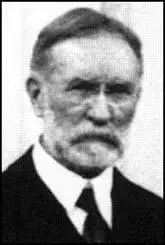George Sutherland

George Sutherland was born in Stony Stratford, England, on 25th March, 1862. When he was a child the family emigrated to the United States. They settled in Utah and was later educated at the Brigham Young Academy and the University of Michigan.
Sutherland was admitted to the bar in 1883 and practiced in Provo, Utah. A member of the Republican Party, Sutherland served the House of Representatives (1901-03) and the United States Senate (1905-17).
After being defeated in 1916 Sutherland became a legal adviser to Warren Harding. Soon after Harding became president he appointed Sutherland to the Supreme Court. Sutherland was a conservative justice and in 1923 outlawed the minimum wage.
Franklin D. Roosevelt, the Democratic Party candidate, was elected as president in 1932. Over the next few years Sutherland and the other justices who were supporters of the Republican Party, ruled against the National Recovery Administration (NRA), the Agricultural Adjustment Act (AAA) and ten other New Deal laws.
On 2nd February, 1937, Franklin D. Roosevelt made a speech attacking the Supreme Court for its actions over New Deal legislation. He pointed out that seven of the nine judges (Sutherland, Charles Hughes, Willis Van Devanter, Harlan Stone, Owen Roberts, Benjamin Cardozo and Pierce Butler) had been appointed by Republican presidents. Roosevelt had just won re-election by 10,000,000 votes and resented the fact that the justices could veto legislation that clearly had the support of the vast majority of the public.
Roosevelt suggested that the age was a major problem as six of the judges were over 70 (Sutherland, Charles Hughes, Willis Van Devanter, James McReynolds, Louis Brandeis and Pierce Butler). Roosevelt announced that he was going to ask Congress to pass a bill enabling the president to expand the Supreme Court by adding one new judge, up to a maximum off six, for every current judge over the age of 70.
Charles Hughes realised that Roosevelt's Court Reorganization Bill would result in the Supreme Court coming under the control of the Democratic Party. His first move was to arrange for a letter written by him to be published by Burton Wheeler, chairman of the Judiciary Committee. In the letter Hughes cogently refuted all the claims made by Franklin D. Roosevelt.
However, behind the scenes Charles Hughes was busy doing deals to make sure that Roosevelt's bill would be defeated in Congress. On 29th March, Owen Roberts announced that he had changed his mind about voting against minimum wage legislation. Hughes also reversed his opinion on the Social Security Act and the National Labour Relations Act (NLRA) and by a 5-4 vote they were now declared to be constitutional.
Then Willis Van Devanter, probably the most conservative of the justices, announced his intention to resign. He was replaced by Hugo Black, a member of the Democratic Party and a strong supporter of the New Deal. In July, 1937, Congress defeated the Court Reorganization Bill by 70-20. However, Roosevelt had the satisfaction of knowing he had a Supreme Court that was now less likely to block his legislation.
George Sutherland resigned from the Supreme Court in 1938 at the age of 76. He died at Stockbridge, Massachusetts on 18th July, 1942.
